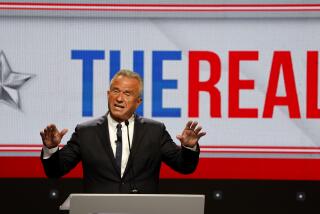Santorum renews attack on JFK’s speech on church and state
Reporting from Mobile, Ala. — Rick Santorum renewed his criticism of John F. Kennedy on Thursday night for saying during his 1960 campaign for the presidency that he believed “in an America where the separation of church and state is absolute.”
“That’s not America,” the Republican presidential hopeful told a crowd at an Alabama dinner banquet. “That’s France. That’s a naked public square where people of faith are out of bounds.”
Santorum’s remarks came as he and former House Speaker Newt Gingrich battle for the support of conservative evangelical Christians in the Alabama and Mississippi primaries Tuesday. Both candidates are Catholic, and both have been playing up religious issues, to the consternation of some fellow Republicans who fret that the party would be better off focusing on jobs.
Former Massachusetts Gov. Mitt Romney, a Mormon who leads in the chase for party nominating delegates, has been less aggressive about overt appeals to voters based on religious faith.
In his dinner remarks, Santorum backed away from his comment that Kennedy’s 1960 speech on church and state made him want to “throw up.”
“Obviously, the language that I used was at a minimum inarticulate,” the former Pennsylvania senator told several hundred people at the Alabama Policy Institute banquet on the Gulf Coast.
But he said his passion stemmed from years of frustration that so many people had succeeded in undermining the right of “freedom of conscience.”
He paraphrased Kennedy as saying, “I will take no advice, directly or indirectly, from anybody of faith. I will not permit that to be discussed.” By saying that, Santorum argued, “he went too far.”
Kennedy, the first Roman Catholic president, gave the speech to ministers in Texas in an effort to assure skeptical Protestants that the pope would not dictate his decisions in the White House.
“I believe in a president whose religious views are his own private affair,” Kennedy said.
Kennedy vowed to make decisions on birth control, divorce and other subjects “in accordance with what my conscience tells me to be the national interest, and without regard to outside religious pressures or dictates.”
Santorum said he would continue to speak out on the importance of religion in public life.
“Please pray for me that I do so more articulately in the future,” he said.
More to Read
Get the L.A. Times Politics newsletter
Deeply reported insights into legislation, politics and policy from Sacramento, Washington and beyond. In your inbox three times per week.
You may occasionally receive promotional content from the Los Angeles Times.











